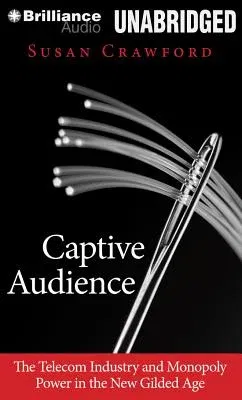Susan P Crawford
(Author)Captive Audience: The Telecom Industry and Monopoly Power in the New Gilded AgeCompact Disc, 2 September 2014

Qty
1
Turbo
Ships in 2 - 3 days
In Stock
Free Delivery
Cash on Delivery
15 Days
Free Returns
Secure Checkout

Language
English
Publisher
Brilliance Audio
Date Published
2 Sep 2014
ISBN-10
1491528745
ISBN-13
9781491528747
Description
Product Details
Author:
Book Format:
Compact Disc
Country of Origin:
US
Date Published:
2 September 2014
Dimensions:
16.51 x
13.97 x
2.79 cm
Genre:
21st Century
ISBN-10:
1491528745
ISBN-13:
9781491528747
Language:
English
Publisher:
Weight:
272.16 gm